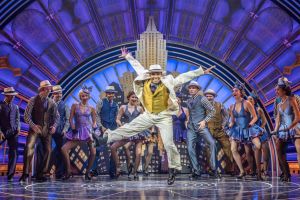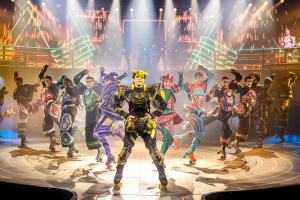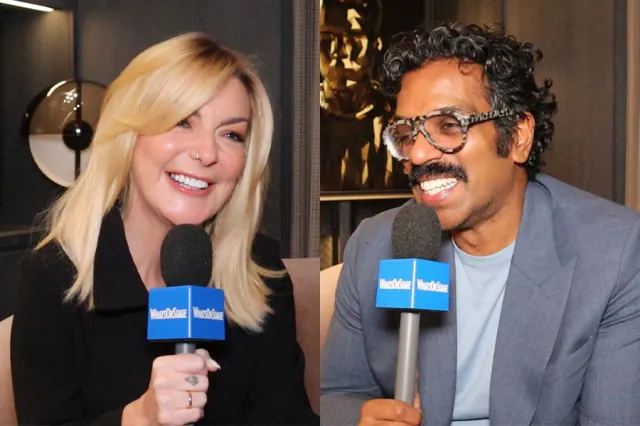20 Questions With… Colm Meaney
Irish actor Colm Meaney – who returns to the stage this week to star opposite Kevin Spacey & Eve Best in A Moon for the Misbegotten – praises Howard Davies, Roddy Doyle & John Cusack & marvels at gradual breaks & Eugene O’Neill’s raw emotions.
After training as a fisherman, actor Colm Meaney enrolled in drama classes at the Abbey Theatre, Ireland’s equivalent of the National Theatre, and went on to appear in numerous stage productions in his native Dublin, before immigrating to New York and making his Broadway debut opposite Derek Jacobi in Breaking the Code.
In 1987, Meaney moved to Los Angeles and has since concentrated on screen work. On television, he’s best known for his role as chief operating officer Miles O’Brien in Star Trek: Deep Nine and Star Trek: The Next Generation.
On film, Meaney’s credits include Con Air, Mystery, Alaska, Under Seige, Far and Away, The Englishman That Went up a Hill But Came Down a Mountain, Into the Beach, Intermission, Layer Cake, Perseverance, The Road to Welville, Come See the Paradise and the adaptation of Irish novelist Roddy Doyle’s Barrytown trilogy comprising The Commitments (directed by Alan Parker), The Snapper and The Van (both directed by Stephen Frears).
In 1999, after more than a decade’s absence, Meaney returned to the stage to appear in a version of John Irving’s The Cider House Rules in New York and the Donmar Warehouse revival of Juno and the Paycock in London.
This month, he makes his first stage appearance since then, appearing opposite Kevin Spacey and Eve Best in Howard Davies’ production of 1947 American classic A Moon for the Misbegotten at the Old Vic.
Date & place of birth
Born 30 May 1953 in Dublin, Ireland.
Lives now in
I live between Los Angeles and New York. You just move from one house to the other. While I’m in London, I’m staying in an apartment over on Albert Embankment.
Training
I always wanted to act from the time I was in high school, but I had some difficulties towards the end of school. In order to pre-empt being expelled, I did the equivalent of going away to sea. I went away to a school that had just been set up for fisherman in the northwest of Ireland. It was great because I got away from school, away from home as a young guy, and they paid me a miniscule amount of money every week to go to the school. We did fun things like study navigation and net mending. That was about a six-month course. When I finished, I did actually work on a trawler for about six weeks and realised very quickly that fishing is a difficult life. So my plan was to try to get into the school of acting at the Abbey Theatre, the Irish National Theatre, and that happened quite quickly for me. So I was fishing for about six weeks and then I went into acting.
Why did you want to become an actor?
I don’t know. The idea of being an actor was so left field. No one in my family was involved in theatre so I was kind of laughed at and scoffed at. My Dad would take us to the Abbey as kids, mainly to Christmas pantomimes – which were actually bilingual, both in Irish and English – and that certainly would have had an affect on me. And now I think that there were films that I saw when I was in my early teens, like Lindsay Anderson’s If…. film and a great John McGrath film that Jack Gold directed, The Reckoning. Those films had a really huge effect on me as a 13- or 14-year-old. From that little bit of experience in the theatre and watching these films, it kind of stuck with me. I never wanted to do anything else.
What was the last thing you saw on stage that had a big impact on you?
Jesus, what was the last thing I saw? It was an Irish play in Los Angeles, two actors talking. Marie Jones wrote it, but I don’t think it was Stones in His Pockets. In Los Angeles, you just don’t go to the theatre.
First big break
I don’t really think I’ve had a big break yet! The way that things have worked for me, it’s evolved rather than been one big thing. I made a conscious decision to leave New York in the late Eighties and go to Los Angeles because I wanted to work in film and television. At the time, there was very little happening in New York; you had to go to LA to do that, because prior to that I had done almost exclusively theatre. I was in Los Angeles for about a year and I’d been doing TV stuff and then I went back to New York to do a Broadway show. As soon as you decide to do one thing, something else happens, you know? My break was very gradual. I did episodes in Remington Steele, Moonlighting and those kind of TV shows over a few years. And then I went into Star Trek. I wasn’t a series regular to start. They liked me but they weren’t sure what to do with me. So they used me off and on for about two or three years, any time I was in town I’d do a few episodes and then they developed this character O’Brien. Certainly in the TV world I got known for that. Then we had the development of that series into Star Trek: Deep Space Nine and I was a series regular on that. I suppose being nominated for a Golden Globe Award, that did change things. It just raises your profile.
Career highlights to date
The Barrytown Trilogy, the Roddy Doyle films, were incredible to do. The Commitments was particularly important to me. I’d been in America about ten years when Alan Parker asked me to come back to Dublin to do it. I’d done a film just before that with Alan called Come See the Paradise. I felt at that point that I’d gone to America and I was working there and I should not come back to work in Ireland again or England. I’m always grateful to Alan for that, because basically he cast the whole thing in Dublin and wasn’t planning to bring anyone from the States. But because we’d worked together he thought “oh I’d like Colm to do that”. It kind of reconnected me to this side of the Atlantic and that led me to The Snapper and working with Stephen Frears on that. They were just wonderful films to work on.
Favourite stage productions you’ve worked on
It was difficult but I loved doing Juno and the Paycock
at the Donmar Warehouse. It’s a great great play and John Crowley, who was the director of that, was a wonderful director. Prior to that, it’s hard to remember.
Favourite directors
John, Alan Parker…. And Stephen Frears is so extraordinary. The one common thread I see with great directors I work with is they’re constantly asking questions. It’s almost like a child – “why why why? what does that mean?” They’re just so curious about everything. It’s nosiness or something. But analysis like that is great from an actor’s point of view because, by the time you actually come to play the scene or do the performance, you feel that your choices are the right choices because you’ve looked at all the alternatives, the director has helped you to look at all the alternatives and the choices you’ve made. That gives you great confidence. The thing that sticks out for me from A Moon for the Misbegotten rehearsals is how wonderful Howard Davies is. He’s an extraordinary director, too. His insights are just beautiful.
Favourite co-stars
I did a film last year with Laurence Fishburne and that was great. He’s a powerhouse, you know, and wonderful to work with, a great guy. I’ve also enjoyed working with Dennis Quaid and John Cusack. John is also a guy who comes from the theatre. He really loves his craft and works in a very generous way.
Favourite playwrights
Chekhov. O’Casey. I must say, one of the greatest theatrical experiences I ever had was seeing Angels in America. Tony Kushner is an extraordinary talent. What he achieved with that play was astonishing. I saw it on Broadway. Actually, I was working on Broadway at the time. I saw it on New Year’s Eve – must have been ’88 – and I saw the two parts together, afternoon and evening. What a day. In terms of other modern playwrights, Brian Friel, Tom Murphy and those guys have written some amazing stuff too.
Are there any roles you’d still like to play?
I know most actors have their eye on certain things they’d like to do at some point, but I don’t really. Maybe it’s because I can only see as far as my nose. At the moment, Phil Hogan is fascinating me. So I can’t look at the next role yet.
Why do you think theatre is important?
I worked with 7:84 theatre company here in England. I always remember a great debate with John McGrath and Trevor Griffiths. Trevor had decided to go off and write for film and television and John basically said that was a mistake. They both had great respect for all media but a fundamental difference on the question of film, theatre and television. John’s point was that theatre is an active experience, the audience actually participate in the creation of a theatrical experience whereas your film and television audience are passive; they can go to the fridge, get popcorn, get a drink, you know, whatever. They’re not actively engaged, therefore you cannot have the same emotional impact, you cannot present the same complexity of ideas or relationships. I always felt I agreed with John on that, that the experience of going to the theatre and sitting in an audience and being involved in a live performance, I don’t think can be equalled in film and certainly not in television. That’s not necessarily a criticism of film and television, they’re just different. So when you say “what’s the importance of theatre?”… well, nothing else fulfils that role in society, nothing else can do that. Therefore, it’s essential that we have theatre; to have a civilisation, you must have a theatre.
If you could swap places with anyone (living or dead) for a day, who would it be?
I wouldn’t mind being Robert Mitchum for a while in the Fifties. He was amazing, just amazing.
Favourite books
I’ve read a lot of William Boyd recently. I suppose everyone else discovered him ten years ago, but I just discovered him a couple of years ago. I love his novels, they’re very witty and insightful so it’s kind of easy reading. Armadillo is wonderful, but my favourite of his is Any Human Heart, it’s just fabulous. I’m usually reading a couple of things. At the moment, I’m reading a history of Spain by Anthony Beevor, and also a book called A Woman in Berlin, which is an anonymous diary about what happened when the Russians moved in at the end of the war. I like to read history and biography mostly, but occasionally someone like William Boyd crops up.
What made you want to come back to the stage?
Back in 1999, I hadn’t done a play for almost 11 years and then I did two, Cider House Rules in New York and Juno and the Paycock here in London. Playing two very heavy parts like that, Doctor Large and Captain Jack, back to back, eight shows a week … it was a very punishing schedule. So that kind of cured me for a while of wanting to be on stage. I wasn’t totally conscious of it, but I guess when Howard Davies asked me to do this, I was sort of amenable to it again. I do remember thinking a few times in the last year that it was going to be seven years this year since I did a play and maybe it was time to start thinking about that again. I think there’s a danger of you leaving it too long. I wasn’t pining away for the theatre, but I think for an actor, especially one like me who’s come from the theatre and has been away for long periods, I think there’s a clock ticking in there somewhere. When it goes a certain amount of time, without being aware of it, you start wanting to do a play.
What do you like about stage compared to screen work?
I love the fact that we have the time, the rehearsal period, and the space to really think deeply about the character and think deeply about the play and the relationships and to discover things about it and yourself.
Why did you want to accept your part in A Moon for the Misbegotten in particular?
I hadn’t read the play in a long time and I hadn’t seen it for about 20 years. I saw it on Broadway with Ian Bannen playing Phil. When Howard Davies called me to ask me to do it, I was kind of like “do I want to do a play again?” A few days later, I picked up the play and read it and it just blew me away. I think a lot of people have the impression that this is a very dark play. Reading it again, I was reminded how much humour is in it. It’s very very funny. I mean, the relationships between these characters are complex and you’re going to see all the games they’re playing with each other and it’s so funny. There’s that aspect to it, and there’s also the aspect that it’s such an emotionally powerful play. The emotions are so raw. Reading the play it makes you laugh, it makes you cry.
How would you describe Phil Hogan?
He’s a farmer, he rents his farm from Jim Tyrone (Kevin Spacey’s character), and he has been renting for about 20 years originally from Jim’s Dad, who in real life would have been Eugene O’Neill’s Dad, James O’Neill. We sort of figured that he came from Ireland, he was born in Ireland and lived in Connecticut all his life and he’s incredible sort of, he has many facets to him; he’s a shyster, he’s a trickster, he’s a blowhard in many ways. The research we’ve done on this period – the twenties – it was a very tough time, things were very tough; this rural Connecticut, you really were living on the edge of survival. You had to be very quick witted and make sure nobody ‘did’ you, so I think Phil’s philosophy is get the first dig in, and that way you’ll never be hurt.
Have you done any O’Neill plays before? Which is your favourite?
I’ve only been in one Eugene O’Neill play before. I played James Tyrone in Long Day’s Journey into Night in California in the Eighties. Some people say A Moon for the Misbegotten is a postscript to Long Day’s Journey because Jim, now an older man, is involved again. My feeling is that this play is just as good. All of O’Neill’s writing – especially his later stuff – is incredibly powerful. I mean, these people are so damaged and their emotions are so raw. It’s an express train of emotions.
The Old Vic is a very historical address. Does that mean anything to you?
Oh yeah, absolutely. Just rehearsing here in ‘99 (for Juno and the Paycock) was very special to me. My possibly favourite actor of all time, Ralph Richardson, spent a long time here. I mean, it just reeks of history and greatness. It’s a bit intimidating!
Speaking of intimidating. Your co-stars have both won awards in recent years for productions of O’Neill plays, both directed by Howard Davies. Do you feel that they’re a step ahead in some way?
Not really. I knew Kevin had done The Iceman Cometh with Howard, but I wasn’t actually aware that Eve had worked with him. If anything, I felt that it was good because they’d know what they’re doing! Therefore, hopefully they’ll be a good guide for me, they’ll help me.
What’s your favourite line from the play?
I have a bunch of favourites. The line that sticks out from yesterday is “yes, I go in the house and talk to myself, so I know that someone with brains is listening to me”.
A Moon for the Misbegotten opens on 26 September 2006 (previews from 15 September) at the Old Vic, where it continues until 23 December 2006.












